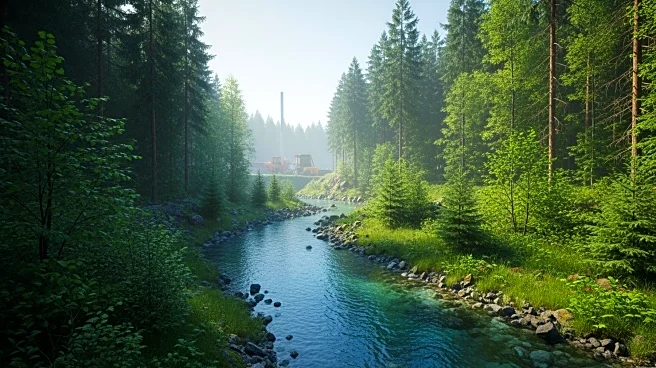What's Happening?
Canagold, a Canadian mining company, is seeking to renew gold mining operations at the New Polaris Mine in northwestern British Columbia. This initiative has sparked opposition from First Nations, environmental
nonprofits, and downstream Alaskan communities. The site, located on the Tulsequah River, has a history of environmental issues due to the abandoned Tulsequah Chief Mine, which has been leaking acid mine drainage into the river for decades. Canagold has been in discussions with the Taku River Tlingit First Nation, whose consent is necessary for the mine's operation. However, other downstream communities, particularly in Alaska, feel excluded from the consultation process. The environmental assessment process is underway, but concerns remain about the potential impact on the Taku River's salmon habitat, which is expected to expand due to climate change.
Why It's Important?
The renewal of mining operations at New Polaris is significant due to its potential environmental impact on the Taku River watershed, a critical habitat for Pacific salmon. The project highlights the tension between economic development and environmental conservation, particularly in regions rich in natural resources. The involvement of First Nations and the lack of consultation with downstream communities underscore the complexities of transboundary environmental governance. The mine's development could set a precedent for future projects in the area, especially as climate change opens up new habitats and resources. The situation also reflects broader issues of indigenous rights and environmental justice, as local communities seek to protect their lands and livelihoods from potentially harmful industrial activities.
What's Next?
Canagold is preparing its application for a British Columbia environmental assessment, a process that could take months or years. The company plans to conduct bi-weekly meetings with the Taku River Tlingit First Nation as part of the consultation process. Meanwhile, environmental groups and downstream communities continue to advocate for more comprehensive assessments and greater involvement in decision-making. The Southeast Alaska Indigenous Transboundary Commission has filed a human rights claim against the British Columbia government, seeking recognition of the transboundary impacts of mining pollution. As the project progresses, stakeholders will likely continue to debate the balance between economic development and environmental protection.
Beyond the Headlines
The New Polaris Mine project raises broader questions about the sustainability of extractive industries in the face of climate change. As glaciers retreat, new mineral-rich areas become accessible, potentially leading to increased mining activities. This situation highlights the need for robust environmental regulations and cross-border cooperation to manage shared natural resources. The project also underscores the importance of respecting indigenous rights and ensuring that affected communities have a voice in decisions that impact their environment and way of life. The outcome of this project could influence future policies and practices in the mining industry, particularly in regions with sensitive ecosystems.









